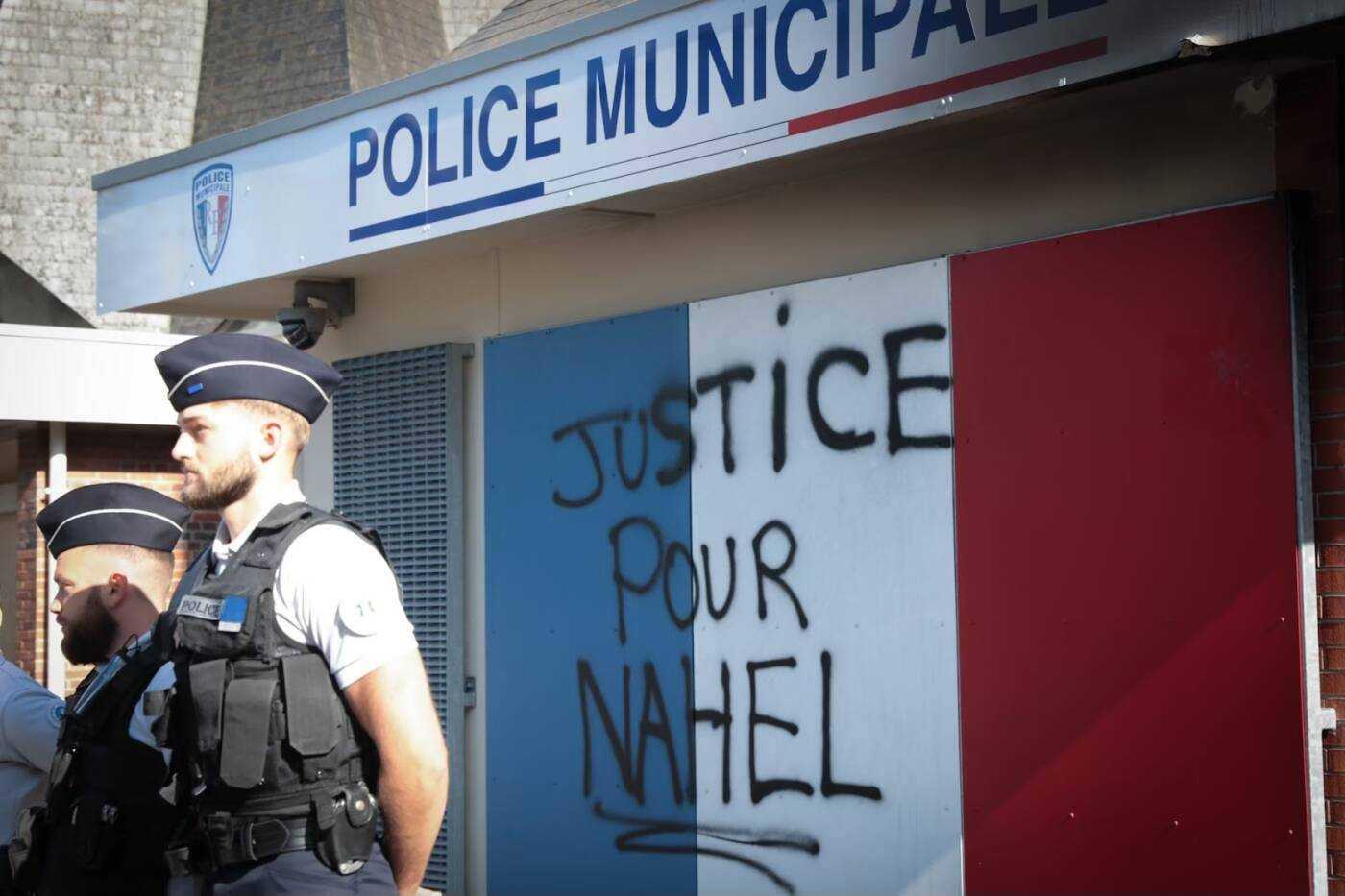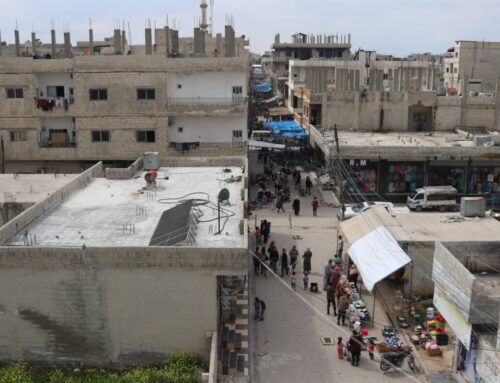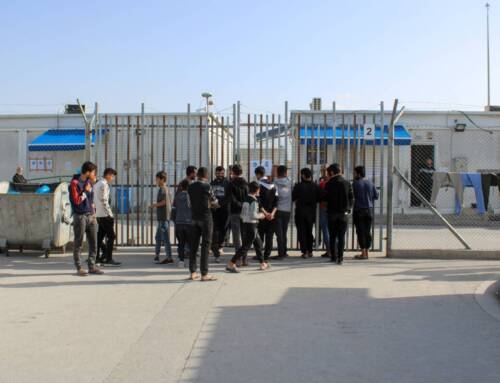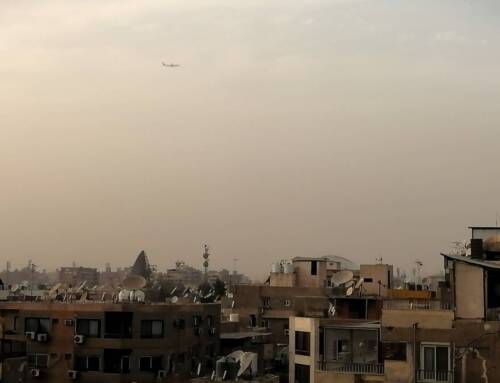French protests revive ‘trauma of war’ for Syrians and new fears for their future
For Syrians in France, recent confrontations between protesters and police have revived memories of the revolution and the ‘trauma of war,’ while provoking new anxieties around the country’s future and their place in it.
22 July 2023
MARSEILLE — Bastille Day is a riot of sound in the Mediterranean port city of Marseille. Booming fireworks echo the cacophony of stinger grenades, flash balls and tear gas that filled these streets in recent weeks as tens of thousands of people protested and rioted across the country in response to the police killing of Nahel Merzouk, a 17-year-old French citizen of Algerian-Moroccan descent.
Marking the anniversary of the French revolution on July 14, a military and police procession weaves its way around Marseille’s Vieux Port. Among the spectators, a handful of timid voices shout out “Justice for Nahel,” then quickly fall silent. The crowd is tense. Protests have calmed, but lingering unease reverberates across the city. Turnout for the annual défilé is lower than usual, residents say.
Roughly two weeks earlier, on June 27, Merzouk was fatally shot by a traffic police officer in Nanterre, a suburb outside Paris. The next day, protests and vigils rapidly spread across the country, escalating into riots in major cities over the weekend. In response, the French government deployed over 45,000 gendarmes and police, as well as helicopters and drones.
In Marseille, historically a city of immigration, more security forces were mobilized than anywhere else in France—and included the anti-terrorism police (RAID) and other SWAT teams. Tear gas and flash balls fired by the police injured protesters and killed one: 27-year old Mohamed B.
For Syrians living in Marseille and elsewhere in France, recent confrontations between protesters and security forces brought back memories of the Syrian revolution and ensuing war. The sounds of police munitions and fireworks lobbed by protestors reminded them of barrel bombs, shells and airstrikes they left behind in Syria. And amid the widespread unrest, many felt “insecurity” in a country where they sought refuge—a sense compounded by new anxieties around police violence, racism and islamophobia.
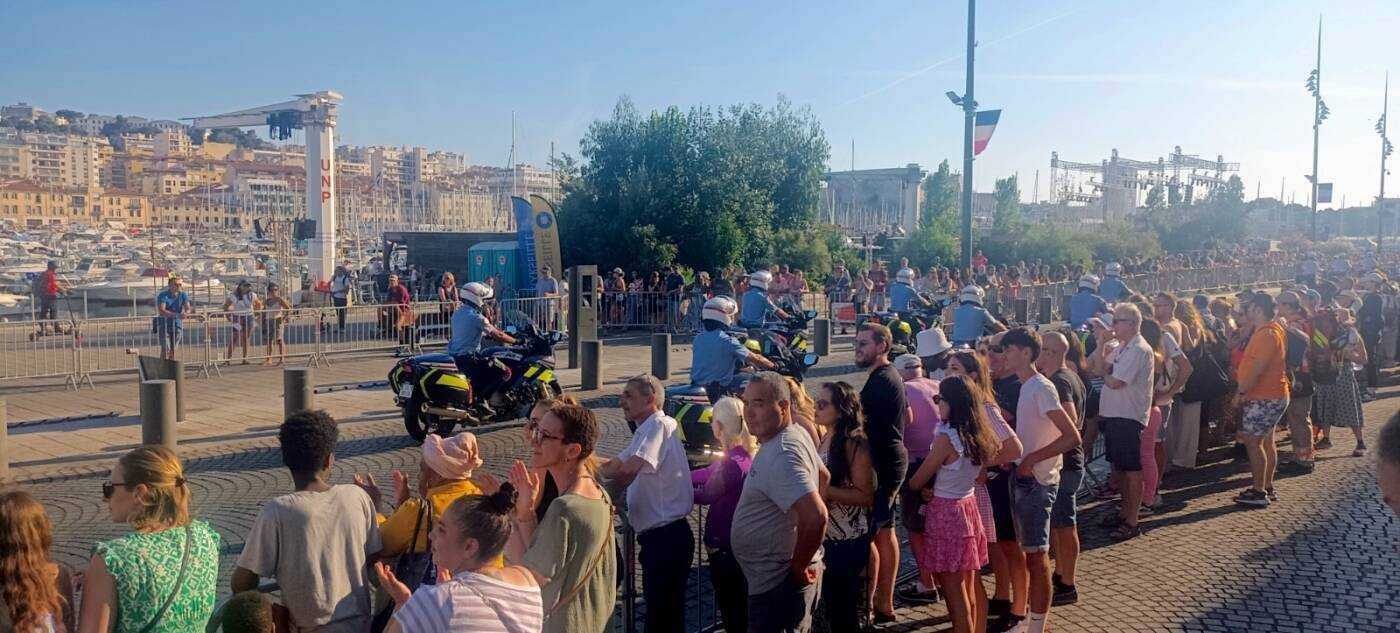
A police procession weaves its way around Marseille’s Vieux Port on Bastille day, two weeks after the city saw major protests in response to the police killing of 17-year-old Nahel Merzouk in a Paris suburb, 14/7/2023 (Natacha Danon/Syria Direct)
‘The trauma of war came back’
Alaa, a 28-year old Syrian who was granted political asylum in France in 2021, “felt the trauma of war come back” when “protests and the conversation around Nahel’s killing began.” From her eighth-floor apartment in Mulouse, a city in northeastern France, she “saw the fires at night, the smoke, the constant sound of sirens, police cars and explosions,” as well as “drones and planes.”
In 2011, back in Syria, she lived in Wadi Barada, an area in Reef Dimashq that was besieged and bombarded by regime forces. During the police crackdown in France, she was reminded of “the sound of planes…when the missiles would drop from them and explode, bringing down entire buildings.”
Alaa fled to Jordan in 2013 after her father defected from the Republican Guard—an elite division of the army that led the repression of protests in Syria. Her uncle was later detained and disappeared, accused of participating in protests. Witnessing the heavy-handed response of the French security apparatus in recent weeks, “I began to view the police as members of the security forces in Syria, which is very upsetting,” she says.
Unsuccessful calls from several French government officials and politicians for a state of emergency to be enacted during the unrest also reminded Alaa of the “state of emergency imposed in the first few months of the revolution” back in Syria.
Mohamed, a 26-year old Syrian-Lebanese man who has lived in France for a decade, was also “reminded of the same insecurity in Syria.” When the 2011 revolution began, he lived in Jobar, a neighborhood of Damascus that came under opposition control and was subsequently bombarded and besieged by regime forces. He “had no desire to relive these scenes,” but as protests raged in France in early July, he experienced “the same sentiment of being confined at home.” He lives next to the Vieux Port, the epicenter of the protests in Marseille.
In Metz, a city in northeastern France, Omar, a 30-year old political refugee, found “stability” and “safety” after he was resettled there with his family in 2021. Still, in early July the mass fires and shootings” in his neighborhood of Borny reminded him of the “bombings and burning markets in Aleppo.”
“Those feelings came back,” Omar says. But while memories resurfaced, what he felt watching the protests unfold in France did not compare to his experience during years of siege in East Aleppo, where he was buried under the rubble when a regime airstrike destroyed his home. In Metz, he was mostly concerned for his six-year-old son and pregnant wife. “My son was so afraid. His fear scared me, that he didn’t feel safe,” he recalls.
Some interactions between French security forces and protesters were familiar to Omar. “Electricity was cut on the street I live on, near the area where the road was blocked and tires and dumpsters were set on fire. This was something similar to what we did at the start of the revolution, when we’d try to block the road so security forces and the regime wouldn’t reach the neighborhoods where demonstrations were taking place,” he says. However, in France, protesters were “firing fireworks at the police” something “impossible” in Syria, he adds. “They’d directly point a gun at you.”
‘Amnesia’
Mohamed arrived in France when he was 16 years old, where he completed high school and is now undertaking a law degree. After 10 years in the country, he recognizes “the anger, the vengeance” of some who took to the streets, and understands “how a part of the population feels marginalized and targeted.” In France, these kinds of “police killings happen on a monthly basis, unlike in Germany, despite immigration,” he says.
In the protests he witnessed in Syria, he remembers his neighbors trying to “protect their communities from a regime they saw as foreign.” In the recent French protests, as he sees it, some demonstrators expressing “pure anger, even towards their neighbors” and destroying property in neighborhoods where they live highlights “they don’t really feel at home.”
Mohamed recalls how the Assad regime would denounce protesters as “mundasin, or [foreign] infiltrators,” drawing parallels to how rioters in France have been widely described as “immigrants, when in fact they are French citizens.”
For Alaa, police violence “against Arabs and immigrants…shows me a racist situation, not the application of law,” a conclusion she is grappling with after less than two years in France.
“Racial profiling is something in France in a country that pretends race doesn’t exist,” says Meryem Belkaïd, a professor at Bowdoin College who specializes in French, North African and post-colonial studies. “Police violence is the moment where this structural racism, this daily racism, becomes way too apparent to pretend it doesn’t exist.”
Belkaïd describes an “amnesia” when police killings take place. “It’s as if it happens for the first time, while anyone observing the political life of France since the 60s [knows] there is political violence from the police towards immigrants…mainly Arabs and Arab men,” she says.
The curfews imposed in many towns and cities to contain the riots after Merzouk was killed—especially in the banlieues, suburbs where immigrant communities are concentrated—are reminiscent of the 1961 curfew in Paris and its suburbs. It applied to “Algerian Muslim workers,” “French Muslims” and “French Muslims of Algeria.” The racist curfew provoked mass protests that were repressed by the police in the notorious 17 October 1961 massacre.
As killings of those with North African heritage continued over the decades, their descendants led protests of their own. In 1983, protesters set off on a three-month “March for Equality and Against Racism” that started in Marseille and ended in Paris. This year marked the movement’s 30th anniversary.
“Nahel is a reminder of something that none of the immigrants forget in their daily life, that actually there is a portion of the French society that is marginalized, treated differently and inferiorized,” Belkaïd says.
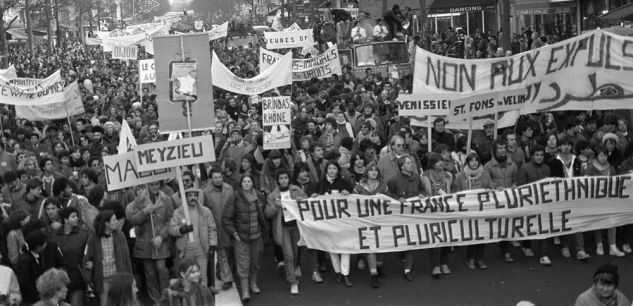
Tens of thousands of North African workers, their children and other protesters holding banners in French and Arabic gather on the Place of the Bastille in Paris, the final destination of the three-month March for Equality and Against Racism that started in Marseille, 3/12/1983 (Dominique Faget/AFP)
‘Natives of the Republic’
For Belkaïd, the societal amnesia she describes reflects “this ability to put aside a very important question, which is the colonial past, and how this colonial past is still impacting French society nowadays.” She says it constitutes “a refusal to admit that it actually explains…Adama Traoré, Théo, and…today Nahel.”
“The French state needs to integrate not immigrants, but its colonial past in its history, in its official discourse,” Belkaïd adds. “France will tell its story as a country that had a revolution—which is a true narrative—but it’s a narrative that is totally incomplete” and “overlooks the violence against what we called ‘colonial subjects’ for a long time.”
She points to les Indigènes de la République, an ‘anti-racist and decolonial’ movement that began in 2005. “They call themselves the Natives of the Republic to show the continuum between the colonial past and today.”
“You can’t go from the status of a colonial subject to the status of a perfect, equal citizen…just because the country that you colonized has become independent. It doesn’t change by miracle, your relationship to what used to be a colonial subject, so ‘inferior,’ ‘uncivilized,’” she explains.
“The racism Syrians will face is of course related to the racism of North Africans for the simple reason that being brown is an indication of you not being totally part of the nation” in a country with a “narrow understanding of what Frenchness is,” especially since “many Syrians are Arab,” she adds.
Mohamed echoes this sentiment. “Of course we [Syrians] are affected. During a contrôle au faciès [racial profiling] the police don’t stop to ask if the person is Syrian or North African,” he says with an ironic smile.
Government response
French President Emmanuel Macron initially condemned the death of Nahel, describing it as “inexplicable and inexcusable” on June 28 from Marseille–where he had traveled to unfold his plan to revitalize the city and combat insecurity, with “increasingly powerful means for the police,” according to a source at the Élysée.
On June 30, the United Nations rights office released a statement saying “this is a moment for the country to seriously address the deep issues of racism and discrimination in law enforcement.”
In response, the French Ministry of Foreign Affairs issued a press statement declaring “any accusation of systemic racism or discrimination among the security forces in France is completely unfounded.”
A 2018 ruling by the European Court of Human Rights, as well as two separate rulings by France’s highest court in 2016 and 2020 have condemned racial profiling and police violence in the country.
Alaa considers the government response to have been “upsetting and provocative” because the officer who shot and killed Merzouk was not arrested until the protests started. She says this “sends a message to the street that if you don’t do those protests and there isn’t pressure, we won’t do anything.”
“It’s true we’re not Algerian,” she says, but the fact that “many North Africans have French nationality” while “Syrians are considered new as refugees” makes her feel even less protected.
Alaa holds a 10-year residency permit in France, “a legal status that is considered really good, but today I don’t feel stable and relaxed, and when the Nahel boy was killed those feelings were reinforced,” she says. She worries “the extreme right could take power in the next elections,” with consequences “for immigrants, refugees or even residents.”
Belkaïd is not optimistic about France’s political future either. She describes a “reactionary, highly conservative moment” marked by “the rise of the extreme right, a refusal to look at the past and a refusal of any discourse that questions the usual paradigms of French society.”
“We’re always living the refugee complex, the refugee trauma,” Alaa says. “Nobody among [us] Syrians can relax—not in Syria, not in neighboring countries…not even those who left for Europe.”

